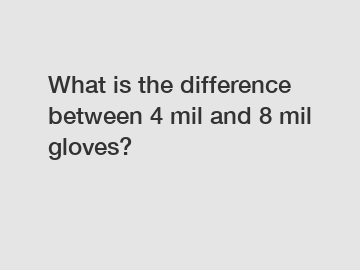What is the difference between 4 mil and 8 mil gloves?
What is the difference between 4 mil and 8 mil gloves?
When it comes to gloves, especially in industries where protection is crucial, understanding the difference between various thicknesses is vital. One commonly asked question is, what is the difference between 4 mil and 8 mil gloves? In this article, we will delve into this query and explore the key points to consider when choosing between these two options.
1. Material Composition:

Both 4 mil and 8 mil gloves are typically made from the same materials, such as latex, nitrile, or vinyl. The significant disparity lies in their thickness, which affects their overall durability and protective properties.
2. Thickness and Durability:
The term "mil" refers to one-thousandth of an inch, which is the standard unit of measurement for glove thickness. 4 mil gloves are thinner than 8 mil gloves, and as a result, they offer less durability and resistance to punctures. On the other hand, 8 mil gloves provide enhanced protection due to their thicker composition, making them more suitable for applications that may involve sharp objects or rough handling.
3. Sensitivity and Dexterity:
One aspect to consider when selecting gloves is the level of sensitivity and dexterity required for the task at hand. Thinner gloves, such as 4 mil, offer increased tactile sensitivity, allowing wearers to feel objects with more precision. This is particularly beneficial in delicate procedures where fine manipulation is necessary. However, thicker gloves, like 8 mil, sacrifice some sensitivity in exchange for enhanced protection. They may be preferred in situations that require a higher level of resistance or insulation.
4. Comfort and Fit:
Wearing uncomfortable gloves throughout the workday can affect productivity and overall satisfaction. Thinner gloves, such as 4 mil, are generally more lightweight and offer a snugger fit that allows for better maneuverability. They also reduce the sweating and hand fatigue that can occur when wearing thicker gloves for extended periods. In contrast, 8 mil gloves may feel bulkier and less flexible, which can limit ease of movement. It's essential to consider the comfort factor when selecting the appropriate glove thickness.
5. Chemical Resistance:
Another critical aspect to evaluate is the chemical resistance offered by different glove thicknesses. Thicker gloves, including 8 mil, usually provide more effective protection against various chemicals, acids, and solvents. This thicker barrier acts as a shield, reducing the risk of harmful substances penetrating the gloves and coming into contact with the skin. However, thinner gloves, like 4 mil, might still offer adequate protection for tasks that involve less hazardous substances or shorter exposure periods.
In conclusion, understanding the difference between 4 mil and 8 mil gloves is crucial for choosing the right hand protection in various industries. Thinner gloves, such as 4 mil, offer increased sensitivity and dexterity, making them suitable for delicate tasks. However, if strong protection against punctures and chemical exposure is necessary, thicker gloves like 8 mil are preferred. Additionally, factors like comfort, fit, and specific job requirements should also be taken into account when making a decision. By considering these points, individuals can select the appropriate gloves that ensure safety, productivity, and peace of mind.
If you are looking for more details, kindly visit White Cleanroom Nitrile Gloves, 5.0g Black Examination Nitrile Gloves, disposable white nitrile gloves supplier.
159
0
0


Comments
All Comments (0)